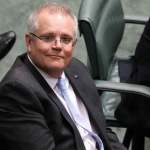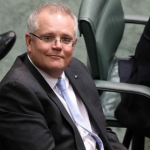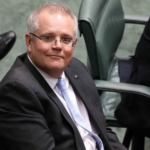The PM’s Religious Shackles: An Interview With Professor Philip Almond

As Scott Morrison took to the podium to claim his election victory in May, he declared, “I have always believed in miracles.” And he wasn’t being figurative, as a born-again Christian, the prime minister certainly does have faith in these acts of God.
Indeed, just a month earlier, the PM invited the media into the Sutherland Shire’s Horizon Church, where he’s a parishioner, to watch him worship. Like Hillsong, Horizon is Pentecostal: a form of Christianity that accounts for 1.1 percent of the Australian population.
Morrison has referred to his faith since he first entered politics. Back in February 2008, when he gave his maiden speech in parliament, he remarked that he’d made a commitment to his religion at an early age. And he also said that although it’s personal, the implications of his faith are social.
And this has certainly been apparent over recent times. In December 2017, as marriage equality became law, he vowed to push for further religious protections, whilst last December, he announced as PM that his government would introduce a Religious Discrimination Act.
Post-election carte blanche
The Liberal Nationals surprise election win has been linked, in part, to a swing in Christian votes. And following this victory, it seems the push for religious freedoms has grown stronger. Attorney general Christian Porter has announced he’ll be introducing the discrimination legislation next month.
Former deputy PM Barnaby Joyce said he’d like the law changes to go further, so as to prevent people being sacked in similar circumstances to Israel Folau. The ex-football star was fired by Rugby Australia after he expressed on social media that gay people are going to hell.
Liberal Senator Concetta Fierravanti-Wells has hailed her party’s election victory as a “new dawn” for religious freedoms. And she further posited that the election outcome had its “antecedents in the same-sex marriage debate”.
Labor’s new leader Anthony Albanese is now under pressure from key members in his party to work with Morrison to pass religious freedom laws, as the swing in religious voters, has convinced the opposition to continue its recent strategy of mimicking the Liberals.
Freedom for the select
Philip Almond is Emeritus Professor in the History of Religious Thought at Queensland University’s Institute for Advanced Studies in Humanities. In a recent article in the Conversation, he outlined five aspects of Scott Morrison’s faith that “will likely shape” his politics.
The professor explained that not only was the PM serious when he suggested that God had actively brought about his victory, but he also pointed out that Pentecostalism is shaping Morrison’s socially conservative viewpoints, and it may well be contributing to his inaction on climate change.
Sydney Criminal Lawyers spoke to Professor Almond about the neoliberal tendencies of prosperity theology, his belief that the Church wants it both ways when it comes to religious freedoms, and why Labor should be careful about in getting into bed with the Coalition on this issue.
Firstly, Scott Morrison has stated that he likes to keep his faith out of the public eye. And yet, it’s certainly been quite pronounced at times since he’s held the top job. Broadly speaking, Professor Almond, how would you say Morrison’s faith has been apparent since he’s been PM?
Right from the beginning of his parliamentary career, he made it clear that his religious belief was front and centre: that he thought his political life was being conducted in terms of Christian principles.
But, the key moment for me in the context of the election campaign, was when early on he invited people into his church to see him at worship. While he says that he likes to keep his faith out of the public eye, he certainly brought the public right into the middle of it from that point on.
A claim like he wants to keep his faith out of the public eye is a nod in the direction of being a member of a secular society. But, really, if he’s a good Pentecostal, then his faith will be informing the way he thinks, and it will inform the way he does things.
His faith is not something he will perform for an hour on a Sunday morning. It’s something that will inform the way he does his work all week.
In your recent article, you spoke about an aspect of the Pentecostal faith termed prosperity theology. Could you explain what that is? And what the implications are of having someone holding such a belief heading the government?
Prosperity theology is really the view that God looks favourably upon those who worship him. And he will reward them with material wealth. For those who have material wealth, it is a sign that they are amongst the saved, rather than the damned.
In some ways, prosperity theology is a development of the traditional view put forward by Max Weber many year ago, that capitalism arose out of the Protestant work ethic. No one is buying Weber anymore, but there’s still a correlation.
It’s between stewardship of the world’s goods and the increase of one’s personal wealth with the notion within Pentecostalism that it’s somehow a sign that you are on God’s side, or that you’ve been elected by God to be among the saved, rather than the unsaved.
So, prosperity theology lines up nicely with the sorts of neoliberal economic views espoused by Morrison, such as “God helps those who help themselves”.
In this sense, salvation has a connection to material wealth. I said in the article that “Jesus saves those who save”, so the godly become wealthy. And that’s a sign of their godliness: wealth is a sign of godliness.
During the election, there was a lot of talk around the need to raise the Newstart allowance. How could prosperity theology potentially shape political action on issues like welfare?
It really means that you’re going to have a view that’s not sympathetic for people on welfare.
You may be sympathetic to those who are unemployed, but a sympathy that goes to helping them to help themselves.
In other words, it’s a theology of self-reliance and pulling yourself up by your own bootstraps. So, it doesn’t sign in with another arm of Christianity, which goes to social justice and social equity.
Pentecostals hold to prosperity theology. And they also have faith in Jesus. So, how do these two concepts line up, when you consider the teachings of Jesus in the New Testament saw him advocating for the poor and the oppressed?
I don’t think they do square up all that easily. One thing that can be said about Jesus is that he seems to line up with the poor and the oppressed, and not with the wealthy and the oppressors. That seems to me to be at the absolute core of Jesus’ teaching.
Even in conservative Christianity that’s been emphasised. If we think back to the 1970s, we see in Catholic theology, the rise of Liberation theology, where it lines up with Marxism as a theology for the poor and the oppressed.
If we look over to conservative Protestantism in America at the same time, we think about Martin Luther King and the Civil Rights Movement.
So, even the conservative wing of Christianity in the not-too-distant past lined itself up with social justice, social equity, civil rights, and human rights.
But, there’s this other stream in Christianity, which lines itself up with the right-wing of politics. And that’s where Scott Morrison’s theology sits.
I’m also very conscious that we’re extracting a lot out of the very minimal information we have about Jesus. But, all my instincts say that Jesus is not the kind of guy who’d be lining up with prosperity theology.
Those who are part of the Pentecostal faith believe in divine providence: that God has a hand in everything and it’s all part of his plan.
What do you think about a leader who holds this belief being in charge of a nation with a great many constituents wanting him to take action on something like climate change?
Again, it lines up with great difficulty. There’s a stream within contemporary Christian theology, which goes through the notion that God has put us in charge of the planet, therefore, we have a responsibility to ensure its well-being.
We’re seeing the development of what is now called ecotheology: theologies of the environment. These dovetail with the necessity to do something about climate change.
But, if you have a strong doctrine of divine providence, which the Pentecostals do, then the idea that we’re obliged to do something about climate change isn’t front and centre. In fact, it’s quite the contrary.
The neo-Pentecostals of the Scott Morrison variety really seem to think that it’s all down to God in the end and there’s precious little that we can do about it if God’s really got the whole world in his hands.
So, there’s a kind of theological disinformation among neo-Pentecostals, like the prime minister, not to take climate change as seriously as many of us think he should.
You also wrote about exclusivism in regard to the Pentecostal belief system, which means they see their way to salvation as the only way. How might someone from a minority religion holding this viewpoint perceive the vast majority of those in the community?
In two ways. It simply means if you hold this kind of exclusive belief, only Christians, and more specifically, those who have been saved by Jesus – who’ve had a personal experience of being born again – will be saved.
Salvation here means only they will go onto eternal life and happiness. And those who aren’t born again and saved are doomed. They’re doomed to go to hell. And not metaphorically, because Pentecostals still believe in the traditional doctrine of hell, in which we will be punished for eternity.
On the one hand, it’s a view that’s apathetic to those who aren’t of the faith. On the other hand, there’s a strong missionary emphasis in exclusivist traditions, where there’s an obligation to preach the gospel to try and bring them inside the tent, rather than leave them outside in the cold at the end of the world.
Does Pentecostalism believe in the imminent end of the world? Yes, it does in principle. But, they don’t make too much of it. It’s more salvation immediately after this life that matters. And getting inside the tent now, so that when you’re dead, you’ll go to heaven.
Religious freedom has been a priority for Morrison even before he became PM. He’s been advocating for greater religious protections. And last December, he announced that his party plans to enact a Religious Discrimination Act.
What’s your take on the religious freedoms debate? And what sort of laws do you think the PM would like to see passed?
The Religious Discrimination Act is on the verge of coming out. My position is it could open a whole Pandora’s can of worms to mix a metaphor.
We need to make a couple of important distinctions. One is to distinguish the belief from the expression of belief.
Freedom of religious belief is already here. You can believe what you like. I can believe anything, and no one is going to stop me believing what I like. The only problem is around how you put that belief into action.
Sometimes beliefs are put into action through words. And then you can think, well, people should be free to express their religious beliefs publicly, as long as they’re not inciting other people to hatred of others, or inciting people to do violence.
So, does Israel Folau have the freedom to express his beliefs? Of course, he does, unless he signed himself up to a contract with Rugby Australia to say that he wouldn’t. So, there’s that issue.
Do people have freedom to act out their religious beliefs? No, they don’t. I might believe in the virtues of having three wives, but I’m not allowed to go ahead and marry three women, because that’s against the law.
So, we already hedge religious actions that follow our beliefs with a whole set of laws. There’s a little cluster of problems in there.
My real worry about the freedom from discrimination legislation is this: it seems to me that Christianity might be wanting it two ways.
We know, that the discrimination legislation really arose from the right-wing of the Coalition, in alliance with the conservative end of Christianity, because they were a bit sulky about same-sex marriage getting through the plebiscite.
And their sulkiness has been mitigated by introducing the Ruddock review and now heading towards the legislation around that.
Where we want to be really careful is that the Church wants it both ways. On the one hand, they want freedom from discrimination. They want Israel Folau to be able to say what he wants as part of his religious beliefs.
But, more worrying is that they not only want freedom from discrimination, they want freedom to discriminate. And this is where the real action will be. This is particularly going to people who are employed within religious organisations, like schools and hospitals.
Should churches have the right to discriminate against people? Yes and no.
If you happen to be somebody who isn’t married but is living with somebody of the opposite or same sex and quietly getting about your business of teaching in schools or working in a Catholic hospital, are we happy about the right to have your employer sack you for that reason? Well, no, we’re not.
On the other hand, if we take that a little bit further and say that we have a biology master who’s teaching kids that the biblical account of creation is a load of cobblers, I understand that a conservative religious school might be a bit antsy about somebody undermining the Christian ethos.
So, that goes on issues around who you are, what you believe and what you do, as against, the promulgation of your views to the extent that they’re in conflict with a religious ethos.
It’s these unintended consequences of trying to legislate about religious discrimination that tend to send shivers down the spines of people who are generally on the progressive side, like me.
Religious schools might have a reason to get grumpy about somebody promulgating their atheism to kids. But, are we going to see gay kids expelled from schools? No. The prime minister’s already said he’s not going down that path. Good thing too.
And lastly, in the wake of the election, it’s been said that part of the reason Labor lost was due to the religious vote. And now it seems prominent members of the opposition are putting pressure on Albanese to work constructively with Morrison on religious freedoms legislation.
If Labor gets on board with the Coalition in regard to some form of religious freedom laws, where do you think this could all lead?
This is a messy one. And the Labor Party should be very careful when it starts to sup with the devil around these kind of issues.
In Australia, everybody tends to dismiss religion. Those who aren’t religious dismiss it as a bunch of irrelevant nonsense. So, much to everyone’s surprise, the religious vote suddenly made an impact in this election, probably around 10 percent.
People in Australia were moved to vote around their religious beliefs. And the Labor Party – to its horror – found that within electorates, which it thought were pretty safe, there were significant numbers of religious believers who were antsy about their position on a number of things.
So, political pragmatism takes the Labor Party now down a path of compromising with the Coalition around issues to do with religious freedom. That’s a tricky path to go down. And it’s a tricky path because of the unintended consequences.
What both the Coalition and Labor need to be careful about is that when they support religious freedom – which on the face of it sounds like a good thing – they don’t end up supporting one particular religious group’s intolerance of other religious groups or of other people’s positions.
In other words, when you sup with the devil, eat with a long spoon, because with support of religious freedom, you may find that you end up supporting various varieties of religious intolerance.







